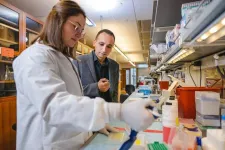(Press-News.org) PHILADELPHIA—(Feb. 21, 2024)—The Wistar Institute’s associate professor Mohamed Abdel-Mohsen, Ph.D., has demonstrated, with his lab and collaborators, a connection between viral damage to the gut and premature biological aging. The group found that this pro-aging connection can contribute to both gut permeability and premature systemic & intestinal tissue aging in people living with chronic HIV infection, and their discovery is detailed in the newly published paper titled, “Distinct Intestinal Microbial Signatures Linked to Accelerated Systemic and Intestinal Biological Aging,” published in the journal Microbiome.
When people's bodies age faster than their chronological years — a condition known as accelerated biological aging — they become more vulnerable to serious health issues usually seen in older adults, including cancers, heart diseases, brain disorders, severe infections, and reduced vaccine effectiveness. Dr. Abdel-Mohsen investigates what drives this rapid aging and how to create ways to slow down biological aging and improve health.
A prime suspect in this aging puzzle is the gut microbiome and its potential leakage into the bloodstream. The Abdel-Mohsen lab investigates how gut leakage can impact the immune system and lead to chronic inflammation, which may accelerate aging.
To delve into this question, Dr. Abdel-Mohsen and colleagues analyzed samples from people living with chronic HIV infection. Living with chronic HIV infection is known to potentially accelerate or accentuate biological age, which makes it an excellent model to investigate mechanisms of accelerated biological age in people living with chronic conditions.
In particular, the investigative team analyzed colon, ileum, stool, and blood samples from people living with chronic HIV infection and well-matched controls. Their analysis revealed a significant connection between disrupted gut microbiomes, increased intestinal permeability (leaky gut), and faster biological aging.
Notably, they observed a connection between accelerated biological aging and the microbiomes of both the colon and ileum, but not the fecal microbiome. This suggests that the location of the microbiome significantly impacts its effects and highlights the importance of sampling intestinal tissues to accurately understand the connection between the microbiome and age.
Biological age can be measured through several advanced methods like telomere length analysis and “epigenetic clocks,” such as the Hannum and Horvath clocks, which evaluate age based on DNA methylation patterns. DNA methylation, which involves methyl groups attaching to nucleotides in DNA, varies with age, and these epigenetic clocks use certain variations in methylation to estimate biological age.
The team’s application of several advanced methods to measure biological age to blood and intestinal tissue samples is the first analysis of its kind in people living with HIV, and their examination of the link between the microbiome and intestinal biological age in this population is a novel exploration of chronic HIV’s aging effects in the microbiome.
The work of Dr. Abdel-Mohsen and his team highlights specific bacteria and their by-products as potential accelerators of aging. These findings open new avenues for developing strategies to mitigate these bacteria and their byproducts, which could potentially enhance the duration of good health in the lives of people living with chronic conditions like chronic infections.
“More investigation is needed to fully understand the underlying causes and potential impacts of our findings,” said Dr. Abdel-Mohsen. “Moreover, there's a crucial need to create strategies to prevent intestinal dysbiosis and gut leakiness and to determine how these strategies could affect an individual's biological age. Our work is just the beginning of an exciting journey into enhancing health and longevity.”
Co-authors: Shalini Singh, Leila B. Giron, Aaron R. Goldman, Joao L. L. C. Azevedo, Toshitha Kannan, and Mohamed Abdel-Mohsen of The Wistar Institute; Maliha W. Shaikh, Phillip A. Engen, Zlata R. Bogin, and Simona A. Bambi of Rush Center for Integrated Microbiome and Chronobiology Research; Shivanjali Shankaran, Alan L. Landay, and Ali Keshavarzian of Rush Center for Integrated Microbiome and Chronobiology Research and Department of Medicine, Rush University; Lorena Orgaz, Nuria de Pedro, and Patricia González of Life Length; Martin Giera, Aswin Verhoeven, and Elena Sánchez-López of Leiden University Medical Center; Ivona Pandrea of University of Pittsburgh; Ceylan E. Tanes and Kyle Bittinger of Children’s Hospital of Philadelphia; and Michael J. Corely of Weill Cornell Medicine.
Work supported by: National Institutes of Health grants R01DK123733, R01AA029859, R24AA026801, R01AG062383, R01AG062383-04S1, and R01NS117458; the Penn Center for AIDS Research (P30AI045008); and the NIH-funded BEAT-HIV Martin Delaney Collaboratory to cure HIV-1 infection (1UM1Al126620). The Wistar Proteomics and Metabolomics Shared Resource is supported in part by NIH Cancer Center Support Grant CA010815. The Thermo Q-Exactive HF-X mass spectrometer was purchased with NIH grant S10OD023586. This research was also supported in part by philanthropic funding from Mr. and Mrs. Larry Field, Mr. and Mrs. Glass, Mrs. Marcia and Mr. Silas Keehn, the Sklar Family, the Johnson Family, and Mr. Harlan Berk.
Publication information: “Distinct Intestinal Microbial Signatures Linked to Accelerated Systemic and Intestinal Biological Aging,” from Microbiome
###
The Wistar Institute, the first independent, nonprofit biomedical research institute in the United States, marshals the talents of an international team of outstanding scientists through a culture of biomedical collaboration and innovation. Wistar scientists are focused on solving some of the world’s most challenging and important problems in the fields of cancer, infectious disease, and immunology. Wistar has been producing groundbreaking advances in world health for more than a century, consistent with its legacy of leadership in biomedical research and a track record of life-saving contributions in immunology and cell biology. wistar.org.
END
Wistar scientists discover link between leaky gut and accelerated biological aging
Dr. Mohamed Abdel-Mohsen and collaborators discovered a connection between gut damage and premature biological aging in people living with chronic viral infection
2024-02-22
ELSE PRESS RELEASES FROM THIS DATE:
Chronic exposure to air pollution may increase risk of cardiovascular hospitalization among seniors
2024-02-22
Key points:
Chronic exposure to fine particulate air pollutants (PM2.5) may increase seniors’ risk of cardiovascular hospitalization, with disproportionate impacts on residents of socioeconomically deprived neighborhoods.
The findings suggest that to protect heart health, there is no safe threshold for chronic PM2.5 exposure, and that the EPA’s newly updated standard for the U.S.’s annual average PM2.5 level isn’t low enough to reduce the burden of cardiovascular disease or protect public health overall.
Boston, MA—Chronic exposure to fine particulate air pollutants ...
iTalkBetter app significantly improves speech in stroke patients
2024-02-22
A UCL-developed app that provides speech therapy for people with the language disorder aphasia has been found to significantly improve their ability to talk.
iTalkBetter, developed by the Neurotherapeutics Group at the UCL Queen Square Institute of Neurology, provides users the digital platform to practice over 200 commonly used words, in their own time and without any limits on the amount of therapy they receive.
While employing games to maintain engagement, the app’s integrated speech recogniser analyses speech in real time to give the user feedback on whether they have named the displayed item correctly.
A new study, published in eClinicalMedicine, ...
Intravascular imaging significantly improves survival, safety, and outcomes in cardiovascular stenting procedures over conventional angiography
2024-02-22
Using intravascular imaging to guide stent implantation during percutaneous coronary intervention (PCI) in heart disease patients significantly improves survival and reduces adverse cardiovascular events compared to angiography-guided PCI alone, the most commonly used method.
These are the results from the largest and most comprehensive clinical study of its kind comparing two types of intravascular imaging methods (intravascular ultrasound, or IVUS, and optical coherence tomography, or OCT) with angiography-guided PCI. The study, published Wednesday, February 21, in The Lancet, is the first to show that these two methods of ...
Air pollution linked to increased hospital admission for major heart and lung diseases
2024-02-22
Short and long term exposure to fine particulate matter (PM2.5) air pollution is linked to an increased risk of hospital admission for major heart and lung diseases, find two large US studies, published by The BMJ today.
Together, the results suggest that no safe threshold exists for heart and lung health.
According to the Global Burden of Disease study, exposure to PM2.5 accounts for an estimated 7.6% of total global mortality and 4.2% of global disability adjusted life years (a measure of years lived in good health).
In light of this extensive evidence, the World Health Organization ...
Children born in October least likely to get flu
2024-02-22
Children born in October are both more likely to be vaccinated against influenza and least likely to be diagnosed with influenza compared with children born in other months, finds a US study published by The BMJ today.
The results suggest that birth month is associated with both timing of flu vaccination and the likelihood of a flu diagnosis - and that October is the optimal time for young children to have a flu shot, in line with current recommendations.
Annual influenza vaccination is particularly important for young children, who are at higher risk of flu and severe ...
Uptake of HIV prevention medication doubles with mix of digital health interventions, study finds
2024-02-22
UNDER EMBARGO UNTIL 6:30 PM EST, Feb. 21, 2024
A UCLA Health-led study found a combination of interventions of one-on-one telehealth coaching, peer support forums, and automated text messages more than doubled the use of the HIV prevention strategy, called PrEP, among younger, at-risk Americans, a group that historically has had low use of the medication.
The randomized controlled trial results, published in the journal Lancet Digital Health, tested combinations of interventions to improve HIV prevention behaviors, including pre-exposure prophylaxis, or PrEP, among younger Americans who have historically ...
Seaports are hotspots of contagious cancer in mussels
2024-02-22
Seaports act as hubs for the global spread of MtrBTN2,1 a rare contagious cancer affecting mussels. In this disease, cancer cells can be transmitted, like parasites, from one mussel to another nearby. While, in nature, such contagion mainly occurs between mussels in the same bed, ports and maritime transport facilitate the spread of MtrBTN2 to other locations, through biofouling, whereby diseased mussels attach themselves to ship hulls. This finding, the fruit of research by a team led by scientists from the CNRS and the University of Montpellier,2 will be published in Proceedings of the Royal Society B ...
Cancer leaders pens "letter to the world" calling for urgent investment as global cancer cases predicted to rise
2024-02-22
In their ‘letter to the world’ they say that cancer is a ‘defining health issue of our time’ that requires a united and collective worldwide response on a par with Covid-19. The scientists argue that we’re at a ‘tipping point’ that could transform how we understand and treat cancer – but more support for life-saving research is required to beat the disease.
The letter is published as Cancer Research UK launched its More Research, Less Cancer campaign ...
Researchers use machine learning to predict how ingested drugs will interact with transport proteins
2024-02-22
Before orally administered drugs can make their way throughout the body, they must first bind to membrane proteins called drug transporters, which carry compounds across the intestinal tract and help them reach their intended targets. But because one drug can bind to several different drug transporters, they may struggle to get past this gut barrier, potentially leading to decreased drug absorption and efficacy. If another drug is added to the mix, interactions between the two compounds and their transporters can cause dangerous side effects.
Researchers ...
New detection method aims to warn of landslide tsunamis
2024-02-22
University of Alaska Fairbanks researchers have devised a way to remotely detect large landslides within minutes of occurrence and to quickly determine whether they are close to open water and present a tsunami hazard.
They write in a new paper that their method of determining a landslide’s location, volume and potential impact is rapid enough to support the National Oceanic and Atmospheric Administration’s goal of issuing a tsunami warning within 5 minutes of a landslide.
“The warming climate is causing glaciers to retreat, leaving behind valleys whose mountainsides and hillsides have lost their ...
LAST 30 PRESS RELEASES:
Gut microbiome connected with heart disease precursor
Nitrous oxide, a product of fertilizer use, may harm some soil bacteria
FAU lands $4.5M US Air Force T-1A Jayhawk flight simulator
SimTac: A physics-based simulator for vision-based tactile sensing with biomorphic structures
Preparing students to deal with ‘reality shock’ in the workplace
Researchers develop beating, 3D-printed heart model for surgical practice
Black soldier fly larvae show promise for safe organic waste removal
People with COPD commonly misuse medications
How periodontitis-linked bacteria accelerate osteoporosis-like bone loss through the gut
Understanding how cells take up and use isolated ‘powerhouses’ to restore energy function
Ten-point plan to deliver climate education unveiled by experts
Team led by UC San Diego researchers selected for prestigious global cancer prize
Study: Reported crop yield gains from breeding may be overstated
Stem cells from human baby teeth show promise for treating cerebral palsy
Chimps’ love for crystals could help us understand our own ancestors’ fascination with these stones
Vaginal estrogen therapy not linked to cancer recurrence in survivors of endometrial cancer
How estrogen helps protect women from high blood pressure
Breaking the efficiency barrier: Researchers propose multi-stage solar system to harness the full spectrum
A new name, a new beginning: Building a green energy future together
From algorithms to atoms: How artificial intelligence is accelerating the discovery of next-generation energy materials
Loneliness linked to fear of embarrassment: teen research
New MOH–NUS Fellowship launched to strengthen everyday ethics in Singapore’s healthcare sector
Sungkyunkwan University researchers develop next-generation transparent electrode without rare metal indium
What's going on inside quantum computers?: New method simplifies process tomography
This ancient plant-eater had a twisted jaw and sideways-facing teeth
Jackdaw chicks listen to adults to learn about predators
Toxic algal bloom has taken a heavy toll on mental health
Beyond silicon: SKKU team presents Indium Selenide roadmap for ultra-low-power AI and quantum computing
Sugar comforts newborn babies during painful procedures
Pollen exposure linked to poorer exam results taken at the end of secondary school
[Press-News.org] Wistar scientists discover link between leaky gut and accelerated biological agingDr. Mohamed Abdel-Mohsen and collaborators discovered a connection between gut damage and premature biological aging in people living with chronic viral infection




